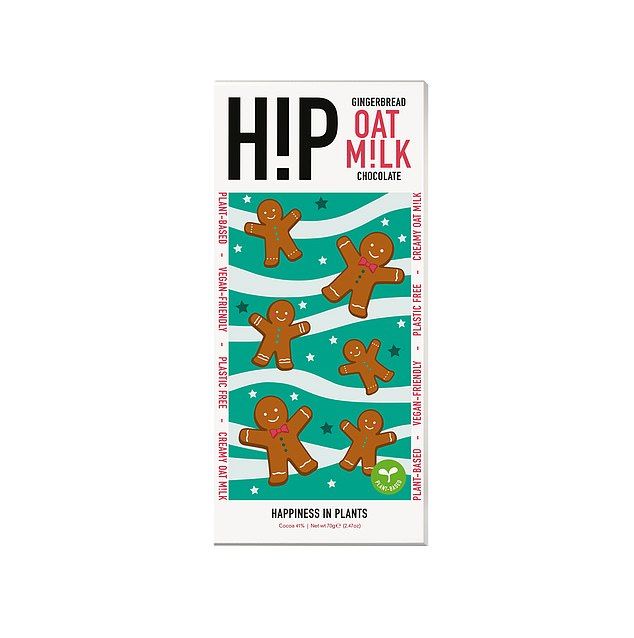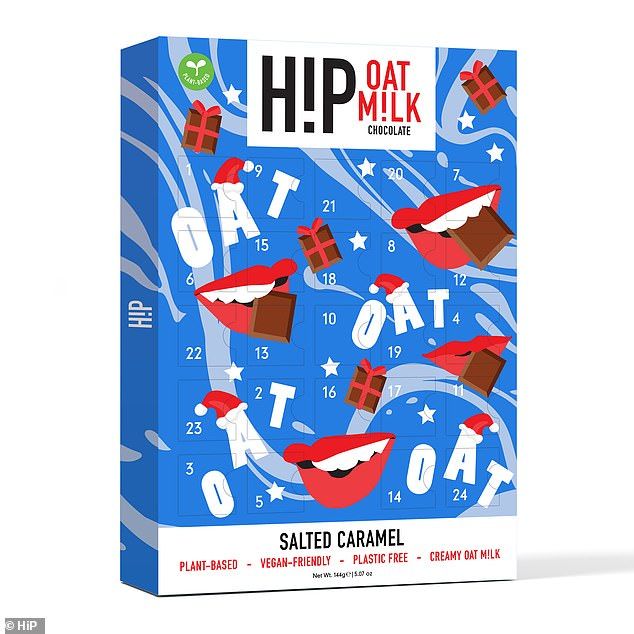
- Nearly a quarter of a million HiP bars have been sold since launch in March
- Founder James Cadbury says HiP will turnover around £1.5m in its first year
- It has launched its first oat milk chocolate advent calendar this month
With a surname like Cadbury, you’d think that James Cadbury – the great-great grandson of John Cadbury – founder of the confectionary business, had his future set out for him. You’d be right – partly.
James’ family is no longer involved in Cadbury, but this hasn’t stopped him from launching his own sweet businesses – sustainable premium chocolate company, Love Cocoa, and a vegan brand Happiness in Plants (HiP).
James launched HiP earlier this year to put his own ethical stamp on the industry and create a vegan product that people like the taste of.
He says: ‘There is substantial room for innovation in the vegan milk chocolate sector with existing brands falling short on taste.
‘If you’ve ever tried dairy free chocolate before, you’ll know exactly what I mean. HiP oat milk chocolate delivers on both taste and looks – it’s a deliciously creamy dairy free alternative.’

Office inspiration
James, 35, says HiP was inspired by the oat milk drinking habits of the employees at Love Cocoa, which he started in 2016 after working as a city trader.
He says: ‘Everyone in the office has reduced dairy and meat and that’s where it all came from. We’re giving people the option too and want them to understand that there is a good quality alternative.’
The HiP business, which is based in east London, produces ethically sourced chocolate. To stamp out modern day slavery they’ve ensured they know exactly who works within their supply chain and source the bars from a family-owned business in Bogota, Colombia, who’ve been growing cocoa for over 100 years.
James says: ‘We saw no one was selling a chocolate bar made of oat milk so we worked with developers in Colombia to create a vegan chocolate. It doesn’t have dairy and it’s 100 per cent plant based.’
The bars do, however, still contain some sugar – but James points out that they have 30 per cent less sugar than the average diary milk bar, plus 41 per cent more cocoa.
Sweet business
To take advantage of the festive season, and to ensure that vegans can also join in, HiP has launched an oat milk advent calendar and limited-edition festive bar.
The calendar, which retails for £10 per 144g, features 24 doors of HiP salted caramel squares and is also 100 per cent plastic free to conform with the brand’s eco and sustainable ethos.
HiP has also launched a festive limited edition gingerbread oat milk chocolate, with gingerbread biscuit and creamy oat milk chocolate, which is also available from hipchoclate.com for £3 per 70g bar.
James says: ‘HiP has well and truly captured the flexitarian zeitgeist with both its hip flavours and branding, so it was a no-brainer to create an advent calendar featuring our bestselling flavour, salted caramel. Ditching dairy no longer means missing out on a quality chocolate advent calendar this Christmas.’
So far, it’s sold 250,000 bars since launching in March. In the first six weeks of the launch, HiP sold 100,000 bars. James expects that the brand will turnover more than £1million in its first year of trading.
While making profit is an ambition, James is willing to delay this to focus on growth.
‘We’re looking to do £1.5million in turnover in the first year, and we’re well on that way to get there. In terms of profit we’re not going to make that as we’ll reinvest that in marketing. We’re just looking to grow the company and not focus on profit too much.’
The products are stocked in Selfridges, Holland & Barrett, WHSmith Travel and Retail and is available through the company’s own website. Tasting packs are available at £11.95.
Love Cocoa, James’ other brand which makes premium chocolate, meanwhile, gained its first listing at Fortnum & Masons – 100 years after it stocked the original Cadbury products.
Its products are also available through Ocado and Farmdrop.
There are plans afoot to get the products into mainstream retailers like Waitrose, Sainsbury’s, Tesco and Morrisons, which will give them the full nationwide coverage they seek.
Expanding abroad is an ambition too and has already begun.
James says: ‘We’ve sold [products] to Ireland and to a Dubai-based supermarket.
‘We’ve had interest from small stockists in Germany as well from people contacting us and wanting to offer plant-based chocolate.’

Covid and Brexit challenges
While creating chocolate may be in his blood, the launch of HiP didn’t come without challenges, which came in the form of Covid restrictions, Brexit red tape and supply chain issues with Colombia.
If it hadn’t been for those three obstacles James claims the launch would’ve happened sooner.
‘Brexit has been a pain with new regulation in terms of country of origin. There’s more paperwork which we have found challenging, and guidance was not as clear as it could’ve been.’
But James now feels the hard work has paid off. ‘It’s been a really great, exciting journey and nice to see customer reactions after all the long hours and Covid.
‘It has been difficult launching during Covid – my team hasn’t worked in the office for a while and getting the team to try it and get feedback has been a challenge, but we’ve adapted using tech and made it possible.’
‘Oat is the future’
James believes that oat milk is the future of chocolate and that it will eventually replace traditional dairy milk.
He acknowledges that the chocolate industry is a competitive one but feels he is doing enough to stand apart from the crowd.
He says: ‘There’s lots of competitors in the chocolate market and you have to do something to stand out.
‘There’s still areas of growth though like the vegan market. We are lagging behind milks – if you look at companies like Oatly they have done very well.’
But James admits that having a unique selling point is not enough. He explains: ‘You can’t just rock up with another chocolate.
‘You must work out what that angle is that makes you special, talk about it and connect with your audience.
‘We talk to our community daily and get hundreds of messages from people wanting to know more about the product.’
























